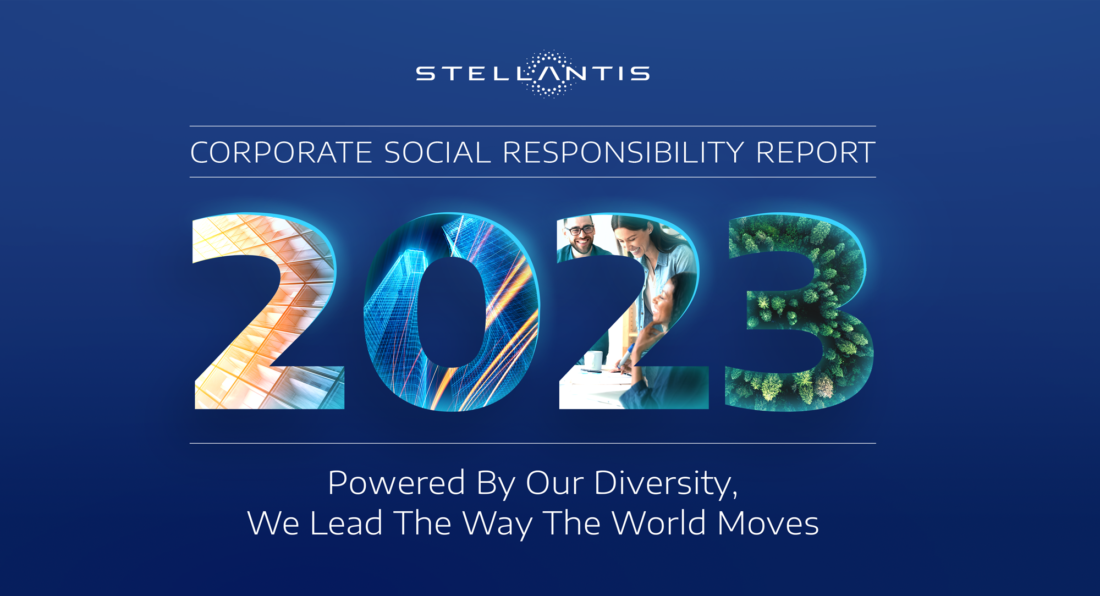Stellantis 2023 Corporate Social Responsibility Report Outlines Strong Results Against Ambitious Dare Forward 2030 Targets
- 2023 carbon footprint trend aligned with the carbon net zero by 2038 roadmap, showing a reduction of 12.6% in emissions for all scopes versus base year 2021
- Using a 360-degree approach with stakeholders, Stellantis implements responsible practices to drive the business
- Stellantis maintains its rapid transformation to a sustainable mobility tech company to reimagine the future of transportation for generations to come
Dubai, United Arab Emirates, April 25, 2024 – Stellantis today released its third Corporate Social Responsibility (CSR) Report, which summarizes the progress made by the Company on sustainability activities geared toward a better society for all.

“While mobility is the first element of our approach to sustainable progress, we also look to create change within our own operations and in our communities – whether that’s through reducing our own impact on the environment, building more inclusive workplaces, or supporting our host communities,” said Carlos Tavares, Stellantis CEO. “Progress in these areas is crucial to successfully providing affordable mobility for our customers and ensuring our stakeholders continue to grant us a license to operate.”
CSR activities are fully embedded throughout Dare Forward 2030, the Company’s long-term strategic plan. In 2023, key CSR initiatives included:
The reduction of the global carbon footprint (all scopes) in line with the Company’s carbon net zero by 2038 commitment: the absolute global carbon footprint (in CO2-eq) reduced by 12.6% in 2023 vs 2021.
The massive use of decarbonized electricity in the Company’s processes with a 100% target by 2030. In 2023, it reached 58%, contributing to a 20% reduction in absolute tCO2 of the industrial carbon footprint (scope 1 and 2) vs. 2021.
The development of Circular Economy activities: In 2023, more than two million parts were recycled (including catalytic converters, fascias/plastic bumpers, alloy wheels and high-voltage batteries) in four regions (Enlarged Europe, North America, South America and Middle East and Africa). Stellantis inaugurated its first SUSTAINera Circular Economy Hub in Mirafiori, Italy, which started up with engine, gearbox and EV battery remanufacturing, vehicle reconditioning and dismantling.
A structured vehicle electrification roadmap involving all brands with 30 battery electric vehicle (BEV) models available at the end of 2023, increasing by 18 in 2024, to reach 48. Last year, BEV sales increased by 21% globally with 18.5% of passenger cars sold in Europe (EU27 excluding Malta and Norway, adding Iceland, UK, Switzerland) and 11.2% of passenger cars and light duty trucks sold in the U.S. being electric or plug-in hybrid vehicles thanks to the growing portfolio.
A comprehensive Human Capital Development strategy anchored on four pillars: engaging in sustainable transformation based on co-constructive social dialogue; attracting, developing and retaining talent, including offering 2.9 million hours of training; empowering diversity and inclusion, with women now holding 30% of leadership positions; and promoting safety, health and wellbeing in the workplace.
Strong monitoring and execution of Stellantis Responsible Purchasing Guidelines: 3,461 supplier groups assessed by EcoVadis, corresponding to more than 89% of the annual purchased value. Results show Stellantis suppliers are performing better on CSR criteria than the EcoVadis benchmark.
A commitment to host communities: Provided more than €18.5 million to support 366 philanthropic projects focused on education and 5,174 Stellantis employees participating in employee volunteerism programs. The Stellantis Student Awards celebrated more than 600 family members of employees for dedication to continuous learning and education, and the Stellantis Foundation partnered with CERN to inaugurate the Science Gateway in Geneva, its new outreach center for science education.
In 2023, Stellantis also held the first edition of the Freedom of Mobility Forum a stakeholder dialog initiative to contribute to the public debate about freedom of mobility in a decarbonized world. Diverse, expert contributors representing industry, academia, government, and civil society debated their ideas during a live debate on the topic: “In a decarbonized world, will freedom of mobility be affordable to a happy few only?” The second debate occurred April 3, 2024, on the topic: “How will our planet accommodate the mobility needs of eight billion people?”
The CSR Report reflects Stellantis’ commitment to a culture dedicated to integrity, responsibility, and ethical behavior in all areas and along the entire value chain and is part of the Company’s efforts to become a more environmentally conscious, socially responsible, and economically viable business.





